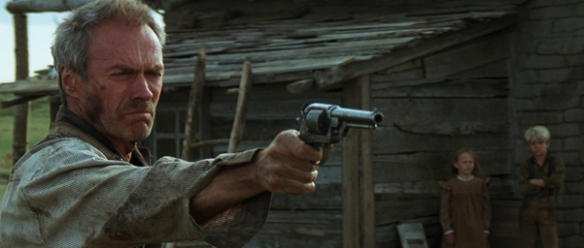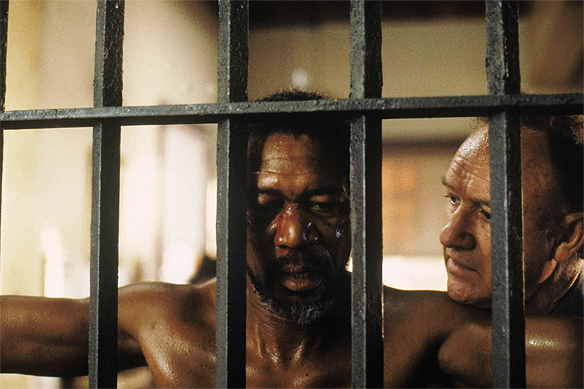 To call the American Western an outdated genre in today’s adrenaline fueled, hectic, counter-culture society may be a depressing truth for many to begrudgingly accept. Perhaps no more so than this entry’s main star, the Edward Longshanks of his cinematic heyday Clint Eastwood. However, instead of fading into iconic ambiguity and sailing away on a leftover career of memories and pity-roles, the Man with No Name decided to embark on one last adventure which not only earned him an Oscar for Best Picture, but also successfully rebooted the Western for modern-day audiences with a longevity that has lasted still now.
To call the American Western an outdated genre in today’s adrenaline fueled, hectic, counter-culture society may be a depressing truth for many to begrudgingly accept. Perhaps no more so than this entry’s main star, the Edward Longshanks of his cinematic heyday Clint Eastwood. However, instead of fading into iconic ambiguity and sailing away on a leftover career of memories and pity-roles, the Man with No Name decided to embark on one last adventure which not only earned him an Oscar for Best Picture, but also successfully rebooted the Western for modern-day audiences with a longevity that has lasted still now.
Unforgiven is a callous and often times grimy look into the world of the American frontier. Its heroes are just as ruggedly pitted as its villains, with the lofty concept of morality gradually fading from the classic black and white days of old into a hundred shades of deep dark grey. Eastwood plays William “Will” Munny, a retired hired gun who gave up the bullet and as well as the bottle after marrying an unseen lover who died from smallpox two years earlier. Left penniless with two small children to raise Munny is approached by a young gunslinger only known as The Schofield Kid on account of the firearm he carries. Schofield (Jamiz Woolvett) makes Munny an offer to split the bounty of a $1000 dollars reward for helping him track down and kill two cowboys who cut up a young prostitute. Unbeknownst to them and then later Munny’s partner Ned Logan (Morgan Freeman), the town which harbours both accused men is controlled by a ruthless sheriff known as ‘Little Bill’, played fiendishly by Gene Hackman, whose own unflinching views on hired gun’s stands between both parties.
With a narrative that follows a relatively straight and simple trend for many Westerns it may seem a wonder how Eastwood’s last foray into the world of blazing guns and tanned saddles stands out so greatly from the rest of the pack. On its surface one could deem Unforgiven to be slow in pace and lacking the appropriate amount of action that such a genre often demands. However on closer inspection, within its celluloid construct, one can see the true inspiration and artistry that Eastwood and screenwriter David Webb Peoples had patiently crafted and matured. Every location, every character, every backdrop and mud-caked set piece is dirty. The world in which the strung out characters try to survive in is as grimy and morbid as one could hope for. The violence such a period contained is never constrained for the lens, displayed almost joyously in Jack Green’s fantastic cinematography. The sky often seems merciless and the sun constantly cold when we’re lucky enough as an audience to see it. Night often permeates the landscape of Unforgiven, leaving us with the impression of a small, lost town stuck out at the ass end of the Wild West.
And lost it truly is. Despite earlier summations one may gain from Gene Hackman’s introductory scene the fictitious lines drawn between good and evil holds no baring on Eastwood’s dark plains. The morality of revenge, of violence, of paying for murder are all forced into ruthless question by way of Peoples’ script. From the performance side the cast could not be better for what becomes such an emotionally epic tale. Morgan Freeman superbly fills the role of the good ol’ sidekick from days gone by, at times even creating the impression that Unforgiven was a much belated sequel to an earlier series of movies they had both starred in. The irritating Schofield Kid never loses his outright arrogance but eventually comes to terms with the harsh reality of the frontier and the price that a man must pay if he takes another life. Richard Harris makes a witty and at first charming entrance as the eponymous English Bob, only to have his reputation and stardom quickly removed when an old rival gets the upper hand. However the real scene stealer comes from Hackman whose sadistically righteous character Little Bill transforms from welcoming authority figure to pure menacing sadist. The interaction he shares with Eastwood provides enough tension to hear a pin drop and haunts the viewer with a truly memorable on-screen dynamic. In short Unforgiven is a modern-day masterpiece. Reinventing its own genre brilliantly and giving birth to the Neo-Western that has delivered onto audiences the likes of Tombstone, Open Range and the Coen Bothers remake of True Grit. Although Eastwood vowed to never star in a Western again, he could not have found a more fitting eulogy for a career that defined the genre from the 60’s onwards but more than that, giving America a new lone ranger to admire after the legendary John Wayne rode off into the sunset.

